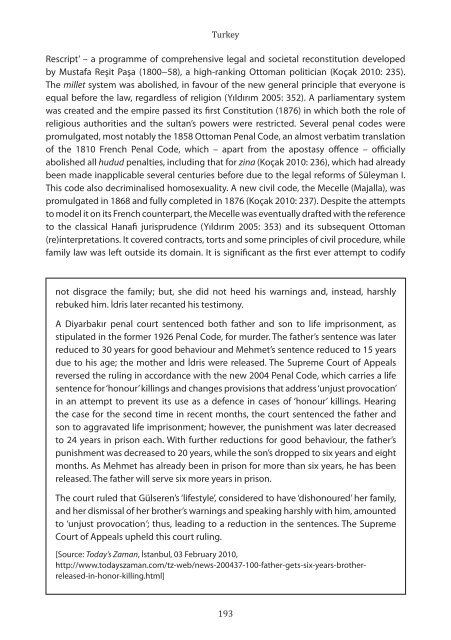control and sexuality
control and sexuality
control and sexuality
- No tags were found...
Create successful ePaper yourself
Turn your PDF publications into a flip-book with our unique Google optimized e-Paper software.
TurkeyRescript’ – a programme of comprehensive legal <strong>and</strong> societal reconstitution developedby Mustafa Reşit Paşa (1800−58), a high-ranking Ottoman politician (Koçak 2010: 235).The millet system was abolished, in favour of the new general principle that everyone isequal before the law, regardless of religion (Yıldırım 2005: 352). A parliamentary systemwas created <strong>and</strong> the empire passed its first Constitution (1876) in which both the role ofreligious authorities <strong>and</strong> the sultan’s powers were restricted. Several penal codes werepromulgated, most notably the 1858 Ottoman Penal Code, an almost verbatim translationof the 1810 French Penal Code, which – apart from the apostasy offence – officiallyabolished all hudud penalties, including that for zina (Koçak 2010: 236), which had alreadybeen made inapplicable several centuries before due to the legal reforms of Süleyman I.This code also decriminalised homo<strong>sexuality</strong>. A new civil code, the Mecelle (Majalla), waspromulgated in 1868 <strong>and</strong> fully completed in 1876 (Koçak 2010: 237). Despite the attemptsto model it on its French counterpart, the Mecelle was eventually drafted with the referenceto the classical Hanafi jurisprudence (Yıldırım 2005: 353) <strong>and</strong> its subsequent Ottoman(re)interpretations. It covered contracts, torts <strong>and</strong> some principles of civil procedure, whilefamily law was left outside its domain. It is significant as the first ever attempt to codifynot disgrace the family; but, she did not heed his warnings <strong>and</strong>, instead, harshlyrebuked him. İdris later recanted his testimony.A Diyarbakır penal court sentenced both father <strong>and</strong> son to life imprisonment, asstipulated in the former 1926 Penal Code, for murder. The father’s sentence was laterreduced to 30 years for good behaviour <strong>and</strong> Mehmet’s sentence reduced to 15 yearsdue to his age; the mother <strong>and</strong> İdris were released. The Supreme Court of Appealsreversed the ruling in accordance with the new 2004 Penal Code, which carries a lifesentence for ‘honour’ killings <strong>and</strong> changes provisions that address ‘unjust provocation’in an attempt to prevent its use as a defence in cases of ‘honour’ killings. Hearingthe case for the second time in recent months, the court sentenced the father <strong>and</strong>son to aggravated life imprisonment; however, the punishment was later decreasedto 24 years in prison each. With further reductions for good behaviour, the father’spunishment was decreased to 20 years, while the son’s dropped to six years <strong>and</strong> eightmonths. As Mehmet has already been in prison for more than six years, he has beenreleased. The father will serve six more years in prison.The court ruled that Gülseren’s ‘lifestyle’, considered to have ‘dishonoured’ her family,<strong>and</strong> her dismissal of her brother’s warnings <strong>and</strong> speaking harshly with him, amountedto ‘unjust provocation’; thus, leading to a reduction in the sentences. The SupremeCourt of Appeals upheld this court ruling.[Source: Today’s Zaman, İstanbul, 03 February 2010,http://www.todayszaman.com/tz-web/news-200437-100-father-gets-six-years-brotherreleased-in-honor-killing.html]193


